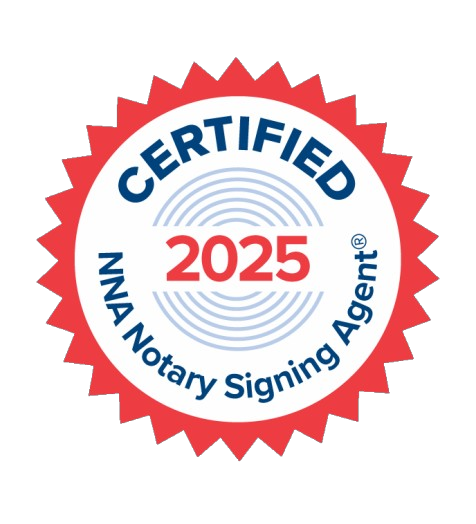Notarial Services
Below is a list of the most common notarial acts offered, their purpose, and what you should bring to your appointment.
Acknowledgment
Purpose: Used when you’re signing a document like a property deed, power of attorney, or agreement. It proves you are the person signing and that you signed willingly.
Bring: Valid government-issued photo ID (driver’s license, passport, or state ID). Your document should be filled out but not signed yet.
Jurat (Oath or Affirmation)
Purpose: Used when you’re swearing that what’s written in your document is true (like an affidavit or sworn statement).
Bring: A valid photo ID. Your document should be filled out but not signed yet. You’ll also take a quick oath or affirmation.
Certified Copy of Power of Attorney
Purpose: If someone has given you Power of Attorney, we can make a certified copy of that document.
Bring: The original Power of Attorney document.
Oaths & Affirmations
Purpose: Sometimes you just need to swear or affirm a statement in person (like for testimony or a sworn declaration).
Bring: Valid photo ID and your written statement.
Accepted Identification Documents
Important Note
If a signer doesn’t have acceptable ID, California allows the use of credible witnesses — one or two impartial people who personally know the signer and present valid ID themselves. The credible witness(es) must take an oath before the notary confirming the signer’s identity.
Accepted Forms of ID:
U.S. Passport
Foreign Passport
U.S. Military ID
U.S. Driver’s License or ID card
Mexican Driver’s License
Canadian Driver’s License
Inmate ID Card
Consular ID card
Special Document Requirements
Some documents require additional preparation steps to meet legal standards before notarization. Review the guidelines below to ensure your paperwork is ready.
Include All Pages: Even if some pages are informational or blank. Accurate Property Details: Ensure legal descriptions, addresses, and parcel numbers are correct. Witness Requirements: Some real estate documents may require additional witnesses — confirm in advance. Recording Compliance: Verify the document format meets county or state recording requirements.
Include All Pages: Even if some pages are informational or blank. Accurate Property Details: Ensure legal descriptions, addresses, and parcel numbers are correct. Witness Requirements: Some real estate documents may require additional witnesses — confirm in advance. Recording Compliance: Verify the document format meets county or state recording requirements.
What Clients Ask Us Most
Everything you need to know before your notary appointment, in one place.
Some documents (like wills, living trusts, or certain loan documents) may require witnesses in addition to a notary.
If your document requires witnesses, it will say so in the instructions from your attorney, lender, or the agency requesting it.
The notary does not provide witnesses — you are responsible for bringing them.
A witness must be over 18, mentally competent, and present during the signing.
They cannot be named in the document or have any direct benefit from it.
Witnesses should bring valid photo ID in case the agency requires proof of identity.
A current, government-issued photo ID such as a driver’s license, passport, or state ID.
The ID must be unexpired or issued within the last 5 years (California’s rule).
No. Documents must be signed in front of the notary (for Jurats and most other acts).
If it’s an Acknowledgment, you can technically sign beforehand, but it’s best to wait so there’s no issue.
No. The notary only notarizes documents you already have. You must bring the document provided by your lawyer, lender, or the agency requesting it.
If your document does not include the notarial wording, the notary will attach the correct California certificate for you.
The notarial wording must be in English.
The document itself can be in another language, as long as the notary and signer can communicate clearly in a common language.
No. These are vital records and cannot be notarized. For certified copies, you must go through the County Recorder’s Office or State Vital Records Office.
California sets the maximum fee at $15 per signature notarized.
Travel fees for mobile notary services are additional and agreed upon before the appointment.


